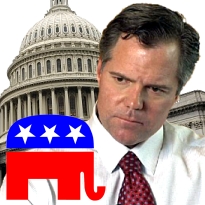 MGM Resorts CEO Jim Murren no longer expects federal online poker legislation to pass in 2012, and he blames Republicans in the House of Representatives for the delay. In a keynote address at the Southern Gaming Summit in Biloxi, Mississippi on Thursday, Murren said online poker will come this year, but it won’t be at the federal level “because the federal government is doing what they are best at,” i.e. sweet FA.
MGM Resorts CEO Jim Murren no longer expects federal online poker legislation to pass in 2012, and he blames Republicans in the House of Representatives for the delay. In a keynote address at the Southern Gaming Summit in Biloxi, Mississippi on Thursday, Murren said online poker will come this year, but it won’t be at the federal level “because the federal government is doing what they are best at,” i.e. sweet FA.
Murren’s comments represent something of a reversal from his position in February, when, on a call with investors to discuss the company’s 2011 financial figures, Murren said he believed the feds would get their act together before the year was through. Earlier this month, on a call to discuss MGM’s Q1 numbers, Murren said the company remained “aggressively focused” on the federal path, but admitted hedging his bet by keeping “keenly aware” of possibilities at the state level.
This week, Murren told his Mississippi audience that the federal option was still the preferred option, painting it as “better at every level than a state-by-state solution. You can more accurately regulate, enforce, tax… You can have a better crime prevention component to it.” But however desirable federal legislation may be, Murren said a “pragmatic” view of the current political landscape had convinced him it wasn’t in the cards. Senate majority leader Harry Reid “could deliver a bill today” but such legislation wouldn’t fly in the House of Representatives, where Republicans hold a majority. “Don’t blame Sen. Reid. Blame the House Republicans. That’s where [legislation] is being held up.”
SOCIAL GAMING: WHO’S GOT THE HORSES TO PULL IF OFF?
Murren also revealed “Casino Mogul” as the working title of MGM’s (for the moment) free-play social gaming offering, which Murren promises will launch by June. Murren said MGM was embracing social gaming in part because the player demographics match those MGM strives to attract to its resorts. Murren insisted MGM didn’t fear competition in this sector, at least, not as much as it feared being left behind as technology opened up new possibilities, much as he said happened to brick-and-mortar booksellers who ignored the ground changing under their feet. Murren called social gaming “a great opportunity for companies that are willing to compete, that have the assets that can compete and have the horsepower to do it.”
But as events from Japan this week demonstrated, monetizing social gaming is a tricky minefield to navigate. Even social gaming powerhouse Zynga, whose CEO has called the fusion of its games with real-money online gambling “a natural fit,” aren’t quite convinced they’ll be able to pull it off all (at least, not all by themselves). In a filing submitted this week to the Securities and Exchange Commission, Zynga admitted that regulatory and legislative changes “may prevent or significantly limit our ability to enter into or succeed in online gambling.” Meeting the demands of regulators and legislators “will increase our costs and subject our business to greater scrutiny” than the company is used to. What’s more, associating its brand with real-money gambling could cause Zynga to “lose current players, advertisers or partners or have difficulty attracting new players, advertisers or partners.” Horsepower may be required to compete in social gaming, but in the real-money gambling world, Zynga doesn’t appear all that confident about flinging open their stable door.